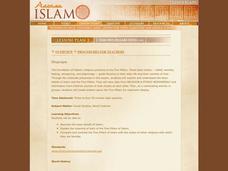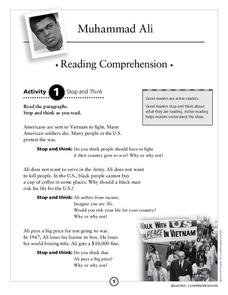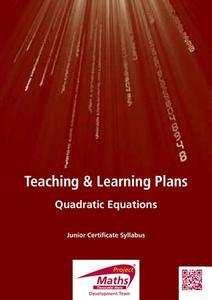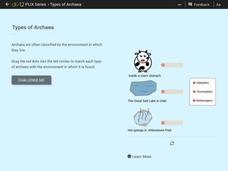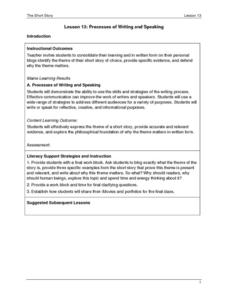Alabama Learning Exchange
The Big Bang Theory: An Evidence-Based Argument
What evidence supports the big bang theory? Individuals analyze scholarly resources about the the theory and develop arguments backed by evidence. They brainstorm, share ideas, watch a video, and read articles to complete a graphic...
Curated OER
The Five Pillars of Islam
In order to better understand Muslim civilization, culture, and politics one must first familiarize themselves on the 5 Pillars of Islam, ideas which dominate much of Muslim societal and cultural norms. Provide your learners with a...
Virginia Department of Education
Creating Thesis Sentences
Growing writers explore what it takes to develop and support a thesis statement with pre-fabricated ideas provided by the Virginia Department of Education. Learners take notes on what makes a thesis statement and a topic sentence, and...
Library of Congress
Muhammad Ali
Muhammad Ali was the greatest, as he'd tell you himself. A set of reading comprehension worksheets walks through parts of Ali's life and promotes individuals to become good readers and writers.
Virginia Department of Education
Brainstorming to Write a Persuasive Essay on Demand
Equip your high school writers for the rigors of timed persuasive writing by employing the preparatory ideas available in this exercise. Learners use persuasive essays, provided by the educator, to acquire how to identify persuasive...
Mathematics Vision Project
Module 6: Congruence, Construction, and Proof
Trace the links between a variety of math concepts in this far-reaching unit. Ideas that seem very different on the outset (like the distance formula and rigid transformations) come together in very natural and logical ways. This...
Odell Education
Making Evidence-Based Claims: Grade 9
Sorry, Charlie. Scholars take a close look at Apology by Plato. Activities analyzing the text help pupils understand, make, organize, and write about claims. Learners work in groups, complete claim tools, and evaluate thinking by filling...
Project Maths
Introduction to Quadratics
Develop conceptual knowledge of a quadratic equation and its solutions in your classes. The third algebra lesson in a series of four introduces learners to solving quadratic equations slowly. The first activity explores the zero product...
New York City Department of Education
Grade 5 Literacy in English Language Arts: Should the School Day Be Longer?
Scholars read newspaper articles relating to a longer school day and complete note-taking organizers as they read. They then form opinions and complete outlines before writing essays supporting their point of view.
EngageNY
Close Reading: Unpacking Specific Articles of the UDHR
Lesson 6 of this extensive unit finally has your class begin to work their way through specific articles from the text of the Universal Declaration of Human Rights (UDHR). Before examining the rights actually detailed in the...
EngageNY
Summarizing Notes: Planning a Graphic Novelette, Part II: The Invention of Television
Let's work together! Using the collaborative resource, scholars work in triads to begin section two of their storyboards about Philo Farnsworth, the inventor of the television. They then practice using linking words and phrases to...
CK-12 Foundation
Types of Archaea
One of the few organisms that are classified by the environment in which they live include archaea. The video describes the phylogeny of the group and their major characteristics. It details how they reproduce and discusses the diversity...
EngageNY
Building Background Knowledge: Learning About the Historical and Geographical Setting of Esperanza Rising (Chapter 1: “Aguascalientes, Mexico, 1924”)
Set up your class to read Esperanza Rising, by Pam Muñoz Ryan, through a class read-aloud and exploration of the setting. The detailed instructional activity outlines each step. First, class members read over the first few pages and...
EngageNY
Grade 9 ELA Module 4, Unit 1, Lesson 2
The second instructional activity in a unit about how writers develop their central ideas and use evidence to support their arguments focuses on the role that scholars at Jundi Shapur, "The World's First True University," played in the...
Maine Content Literacy Project
Processes of Writing and Speaking
As this short story unit comes to a close, provide a day for a full examination of theme and allow some time in class for individuals to work on their various assessments. This final lesson before presenting iMovies and portfolios is the...
EngageNY
Grade 9 ELA Module 4, Unit 1, Lesson 21
Class members read the chapter, "Serfs and Sweetness" from Sugar Changed the World, and identify the central idea that the development of beet sugar and modern farming technology changed the reliance on the plantation system and made...
Pennsylvania Department of Education
Comparing Key Ideas and Details in Fiction and Nonfiction
Students recognize the differences between fiction and nonfiction texts. In this genre study lesson plan, students discuss what nonfiction means and write the definition. Students listen to a read aloud and vote whether the text is...
Pennsylvania Department of Education
Exploring Key Ideas and Details in Fiction and Nonfiction
Third graders participate in activities to differentiate fiction from nonfiction. In this fiction lesson plan, 3rd graders describe the elements of a fiction story. Students compare and contrast fiction and non fiction...
Curated OER
Integrating Art Into Other Content Areas
Here are some ideas to help add an art lesson to every math, science, social studies, or language arts unit.
Curated OER
Mapping Out the Story
Discuss the reading comprehension strategy of summarization with your elementary schoolers! They read a chapter from their social studies textbook, Regions Near and Far, and create a map, or word web, for the chapter. They identify...
Curated OER
Summarization Superstars
How do you read when you know you're going to be summarizing a text? Summarize a nonfiction text with your upper elementary schoolers. Your pupils independently read a nonfiction article and write a summary paragraph using the six-step...
Curated OER
Paragraph Construction
What is a paragraph? This question drives the PowerPoint. Viewers discuss important elements of a solid paragraph, transitions between paragraphs, and strategies for editing. Show this presentation and then look at an example...
Polk Bros Foundation
Show, Then Write What You Learn
After reading a text or covering a new topic, have class members fill out the four boxes on this page with facts. Individuals can use words or drawings to represent the facts.
EngageNY
Organizing Evidence from Multiple Informational Texts to Prepare for Writing: What Makes an Earthquake a Natural Disaster?
Fifth graders prepare for their end of the unit essay assessment by continuing to look at what makes an earthquake a natural disaster. They complete a graphic organizer and write a topic sentence. To finish, they view a model essay and...



